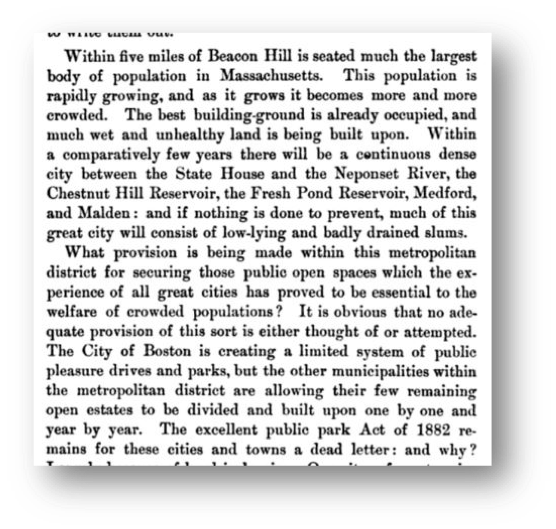Study ranks Boston's green space 'per resident' in list of 15 major U.S. cities
Boston is home to some truly spectacular, and historic, parks and open spaces including more than 2,300 acres of green parkland maintained by the City’s Park Department.
Frederick Law Olmsted and Charles Eliot, two of the founding fathers of landscape architecture, left their mark across the city more than a century ago, with the 1,100-acre chain of parks known as the Emerald Necklace. Many of the gems in the strand remain some of the most loved attractions for tourists and locals, including Boston Common, Boston Public Garden, and Franklin Park. An employee of Olmsted who contributed to the designs of Franklin Park, the Arnold Arboretum and the Fens, Eliot also played a critical role in shaping Boston’s Metropolitan Park system and went on to found The Trustees out of a concern for dwindling public, open-space in the city.
Today, Boston is one of only two cities in the nation to have a park within a 10-minute walking distance for all residents, regardless of income, age or ethnicity, according to the annual ParkScore ranking from The Trust for Public Land.
However, compared to 14 other major U.S. cities, Boston ranks in the bottom three for the amount of green space per resident, according to a new study released by telematics company Geotab. The study divided the amount of green space, roadway and buildings by each city’s population, using OpenStreetMap data and the latest U.S. Census estimates. The research identified Boston as having (per resident) 168 square feet of green space, 370 square feet of roadway and 440 square feet of buildings.
According to these figures, Boston ranks as #13 followed by Miami, FL and New York, NY. Boston has 508.9% less green space per resident compared to the highest-ranking city on the list—Atlanta, GA. Dallas, TX placed second on the list with 870 square feet of green space per resident, and Portland, OR ranked third, with 856 square feet.
Efforts are already underway to expand the city’s green space, by the City of Boston as well as public and private partners. In October 2018 Mayor Martin J. Walsh released his “Resilient Boston Harbor” strategy, calling for increased investments and improvements in green infrastructure—including enhanced parks along Boston’s vulnerable waterfront. Additionally, The Trustees launched the One Waterfront Initiative to build a series of resilient parks along Boston’s harbor, in a nod to founder Charles Eliot’s visionary concern for the City, outlined to Governor William Russell more than 125 years ago.
Trustees Founder Charles Eliot outlined his concerns for dwindling public space in the city, in this letter to Governor William Russell in December 1890.
“What provision is being made within this metropolitan district for securing those public open spaces which the experience of all great cities has proved to be essential to the welfare of crowded populations?” Eliot wrote in his December 1890 letter.
The benefits of green space are numerous and well-documented, with positive recreational, cultural, and health impacts for communities and individuals. They can also become anchors for strong economic activity through increased property values. A study conducted by The Trustees last year found strong support among those surveyed for creating parks, gardens, and open spaces to help attract more visitors and generate more economic opportunities for local businesses. In total, 52% expressed support. Additionally, well over half of respondents (60%) said that living close to open spaces was extremely or very important when considering where to raise a family.
“Boston is a unique city, one where its leaders and businesses already recognize the value of green space, for its resilience benefits but also for the quality of life it brings,” said Nick Black, Managing Director of the One Waterfront Initiative. “Our Initiative has several potential new park sites under consideration and, together with City officials, we are working to bring our vision to life—a vision for a greener, more resilient waterfront City, with welcoming and accessible parks for all.”
The One Waterfront team looks forward to continuing to work with communities and partners around the city to bring a vision of a greener Boston to life. Our scenic and historic city deserves additional world-class parks to match its world-class reputation.
###
The Waterfront Initiative launched by The Trustees seeks not only to build resilient waterfront parks, but to build accessible and welcoming open space that adds to the acreage and amenities of the city’s overall park system. Working alongside partners and city officials is a critical piece of this effort, as Boston citizens and leaders alike are already pushing for more world-class green space that befits a world-class city. To learn more about our vision, visit: https://onewaterfront.thetrustees.org/vision
[Main thumbnail image by Michael Shivili from Pixabay]


